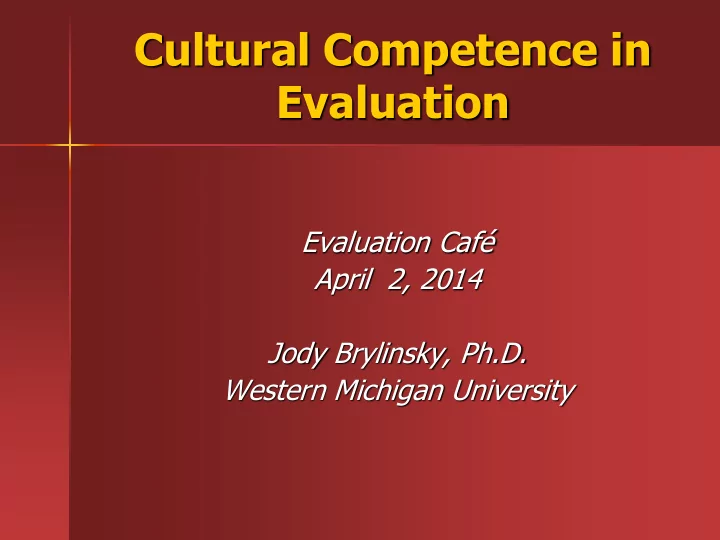

Cultural Competence in Evaluation Evaluation Café April 2, 2014 Jody Brylinsky, Ph.D. Western Michigan University
We live in a designed world, created by human thought, word and deed. …expressions of values embodied in structures, systems, strategies, relationships, roles, policies, procedures, products, and services….choices.
Culturally competent evaluation “ Appropriate programs, standards, interventions and measures”… “specific, relevant, and valid for each unique group.” “Evaluation is fundamentally an endeavor of determining values, merit and worth.”
context in which evaluation takes place Identification of evaluation goals Definition of successful outcomes Selection of methods and instruments Collection and analysis of data Dissemination of results Multicultural validity
Implicit Association Test Unconscious roots of preferences and beliefs Unaware Private Influence behavior whether we want them to or not
Identity Values Behavior Behavior Identity Values Largo-Wight, 2007
Cultural Group Memberships Identify specific cultural group identities Consider influence of each identity – …most aware of – … think least about – … give you privilege – … limit your options.advancement – … learn more about – … make you uncomfortable – … affect the way you see yourself – … greatest positive or negative effect
Cultural Competence = ability to function effectively in diverse cultures Set of academic and interpersonal skills Increase understanding and appreciation of cultural differences & similarities Willingness to draw on community- based values, traditions, customs Value diversity both between and within groups
Cultural Competence Continuum Cultural proficiency Cultural competency Cultural pre- competence Cultural blindness Cultural incapacity Cultural destructiveness
Institutional Assessment Tools - Develop staff and organizational sensitivity Develop a descriptive community profile Identify community contacts and resources Foster community trust/involvement Develop culturally sensitive strategies/materials Evaluate the cultural sensitivity of programs Communicate program objectives and results to community Foster culturally diverse ownership of program
Institutional …..”isms” The collective failure of an organization to provide an appropriate and professional service to people because of their cultural group memberships. – Process or policies – Attitudes or atmosphere – Expectations & Behavior
Organizational Assessment Consider how cultural competency is reflected in organization’s mission. Ask how diversity is linked to the organization’s core values. Link what people know and do in being productive to organization’s success. Link cultural competence to compensation and performance policies Measure results – change in organizational culture and productivity
Organization Inclusion Survey DUTI.com 2006 Members in this organization as whole… – ..are free of prejudice towards other groups – ..are aware of what they can learn from working with members of other cultures – ..believes that diversity increases productivity – ...understand other cultures have different views on collaboration – ..make people of other cultures feel comfortable in their presence
Process-Oriented Approach Collaboration Reflective Adaptation Contextual Analysis
Example Culturally appropriate evaluation measures – Altered question format – Utilized narrative characteristics of culture – Focused on values relevant to culture – Used an alternative source of data
Cultural Competence in Evaluation Active awareness Consideration of contextual factors Responsive and inclusive means Evaluations that “seeks” vs evaluation that “checks”
Recommend
More recommend